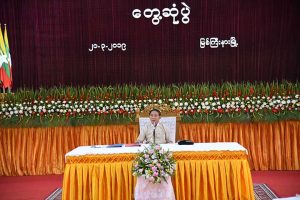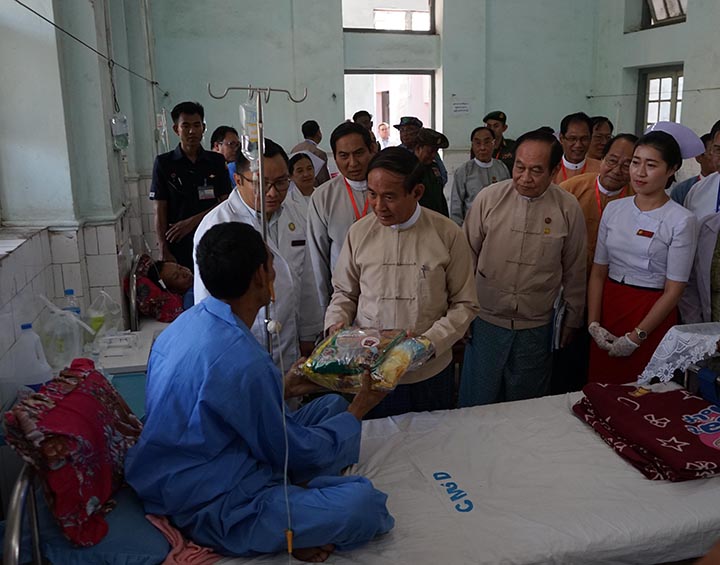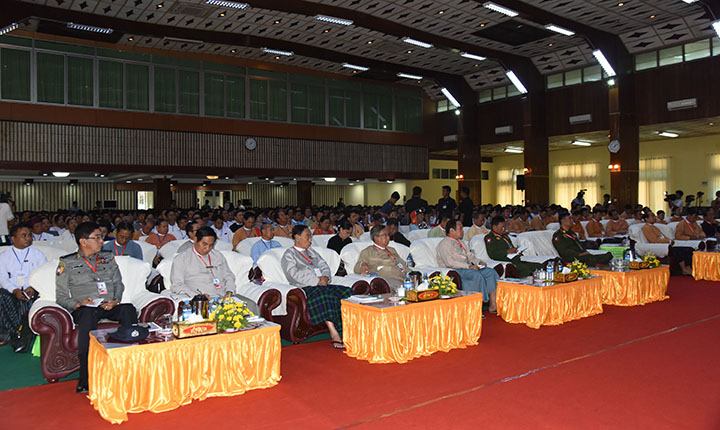President U Win Myint accompanied by Union Ministers Lt-Gen Kyaw Swe, Lt-Gen Ye Aung, Dr. Myint Htwe, U Han Zaw and Nai Thet Lwin, Myanmar Police Force Police Chief Lt-Gen Aung Win Oo and officials left Nay Pyi Taw by Tatmadaw special plane yesterday morning and arrived in Kachin State, Myitkyina.

The President and party were welcomed on arrival at the Myitkyina airport by Kachin State Chief Minister Dr. Khet Aung, State Hluttaw Speaker U Tun Tin, State High Court Chief Judge U Tu Ja, State Advocate U De Hsim Ran, State Auditor U Tin Hlaing, Speaker U Dain Khan Phone @ U Khan Lin, state ministers, Hluttaw representatives, officials from state level departmental organizations and ethnic national cultural troupes.
From there President U Win Myint went to a meeting with State government members, Hluttaw representatives (Pyithu, Amyotha and State), State Hluttaw officials, state, district and township departmental officials held at Myitkyina Town Hall and delivered a policy guidance speech.
In his speech the President said now was the time when the country was undergoing a transition towards democracy. It was with the aim of increasing the momentum of the transition that the visit was made. Myanmar was determined to establish a democratic federal union and a democratic system provided equal justice, security, happiness and rights. A union system granted self-determination, self-rule and equality.
A democratic system supported the establishment of a federal union and the establishment of a federal union strengthened the democratic system. There were many difficulties and hardships when transitioning from an old system to a new system. Those who were performing their assigned duties must not despair from facing these difficulties and hardships and were to take it as an opportunity to show their capabilities. There would be difficulties and hardships at the beginning of any transition period.

When facing such difficulties and hardships there would be concerns in some transition processes or possible delays, hindrances and increasing of burdens. These were not a matter of concern. Transition was not to be taken as an enemy and to be concerned with. All need to understand that transition was a good friend to our people and the country’s development. Transition was not a threat or a danger and must be understood as an opportunity for the country’s development.
Only when all the citizens took part in the transition could they obtain the opportunities. If not, they would lose the opportunities. Transition consisted of administrative, legislative and judicial sectors. Administrative sector transition needed to be an administrative system that supported rule of law.
In an administrative system that supported rule of law, administrative matters were done according to law. The type of administrative system we want was people-oriented and must be administrative machinery that benefited the people. The administrative machinery must not oppress and restrict the people. Administrative sector needed to be aware of the fact that if the administrative system was not beneficial to the people, it would diverge greatly from a democractic system.

There were State Hluttaw law and rules in the legislative sector. Those law and rules must be followed. If the legislative sector influenced the administrative sector, there would be problems between the two pillars. In the same way, the judicial pillar also needed to implement their works properly in accordance with the enacted Constitution. The three pillars were to monitor one another but must not influence each other.
Only when the Hluttaw law and rules were properly practiced can there be support for rule of law. The Judiciary sector also needed to be unbiased. There must be no discrimination based on power, money, race and religion and judgments need to be according to the laws and rules. All citizens and peoples are equal in the face of the law. Only then can there be a firm democratic system. No one must be above the law and only when a just society was established could a democratic system prevail.
State and region governments implemented the policies of the Union Government. They also instructed and managed the departments. A good state administration and management would support the development of the state and the union. All needed to strive towards the benefit of the people and the country and perform their duties and responsibilities. Transitioning from a system to another could not be done single handedly or by a single entity. All needed to participate and only then could there be progress in our country’s move towards democracy.
Rule of law, democracy and human rights were three interlinked sectors. Violation of one would result in violation of all. Human rights needed to be protected and raised. The Judiciary needed to be straightened.
Judges were to inspect and look into the conditions of the prisoners in prisons. Only then could the transition be on the right path. The beliefs of the personnel need to be changed, reformed and guided. Success would be achieved and works straightened only when there were changes in the beliefs of the personnel. In a transition, emphasis must be on what you could do for the country rather than on what the country could do for you. In a democratic system, citizens need to understand their duties. Sovereignty comes from the people.
There would be no success if the rights to do things were taken as a power. If the thought of position being power came into the mind, our works would not be correct. Development of a state would be dependent upon the correct and quick decisions of the state governments. Only then could there be benefit for the state and the people in the state. Democracy would fail if the state and region governments were poor and bad in their administration and management.
There must be responsibilities and obligations for an administration to be good. Whatever was done must be done transparently. Whether the outcome was good or bad must be predictable. State/region governments needed to consult with state/region advocates in order for their works to be in accordance to the law. State/region auditors needed to be consulted on fund usage so that it was in accord with the financial rules and regulations. All needed to be dutiful and conduct their works properly, said the President.
Next Kachin State Chief Minister Dr. Khet Aung explained about regional development works conducted by the Kachin State government, State Hluttaw Speaker U Tun Tin explained about State Hluttaw affairs and State High Court Chief Judge U Tu Ja explained about State judiciary matters.
In response to the explanations made, the President commented on the judiciary sector to judge the cases correctly, quickly and without any delays. Confiscated evidences must be handled in a timely manner and according to the law so that public funds were not wasted. Hluttaw representatives needed to go down to their constituencies and must be in touch with their constituents. Returning of confiscated lands were to be done according to policies, laws, regulations set by the Union government and matters relating to drug, timber and jade must not be ignored and action taken according to the law.
Emphasis must be placed towards caring for the health and livelihood matters of people avoiding conflicts and resettlement and security matters for them need to be conducted. There were restrictions on all three pillars and all must not go beyond these restrictions. The President urged them to take this opportunity to review what they have done for your region, state, union and the people. As future generations would evaluate how they had performed the responsibilities that fell on their shoulders, you were required to perform to the best of their abilities, said the President. He then cordially greeted the attendees of the meeting.
After the meeting the President went to the Myitkyina People’s Hospital where hospital Superintendent Dr. Phone Maw explained about the hospital, treatment and prevention works and requirements at the hospital meeting hall. The President provided necessary guidance and then encouraged the patients undertaking treatment in the hospital and donated food stuffs.
Following this, the President inspected the construction status of a new four storey ward and took a commemorative group photo with the hospital superintendent, doctors, nurses and hospital personnel.
— MNA
(Translated by Zaw Min)


